Uttar Pradesh, India: the unborn child of a woman was murdered in her womb because she had conceived this child with a Muslim man who she is in love with and wants to marry.


My stomach churned when I first read this. There was a split second in which many thoughts flashed in my head- surely India will erupt in horror, surely the Supreme Court will take Suo Moto Notice, surely political parties will take to the streets against the government, this was so barbaric, surely something drastic will happen now. Then the churning stopped and I gradually became fine. Because I remembered this:

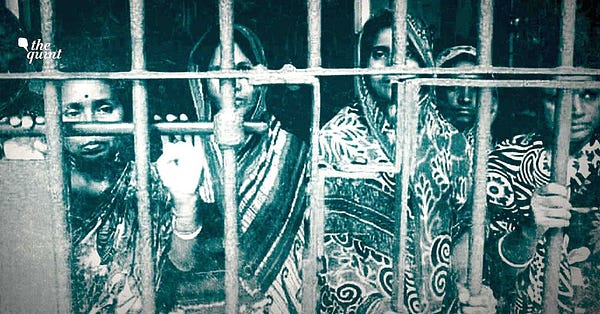
I also remembered that saare jahan se accha, Hindustan hamaara. Why should anyone be shocked about this murder in a country where the girl child continues to be killed in the womb. In 2018 5.5 Lac girls were killed in the womb in India. Those are the official statistics. I also remembered:

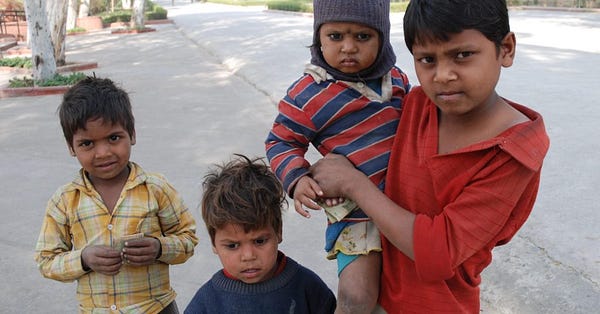
Why should the reaction to this particular murder be any different? Because it this time the murder has happened in the background of a law which has criminalised inter faith marriage? Because the BJP has orchestrated so much hate against muslims that in that hatred babies in the wombs of Hindu women are being killed? No, I haven’t been living under that big a rock. The whole world knows that there is no limit that Indians won’t cross in their hatred for their fellow countrymen. No there is nothing to see here my friends, what shock and what outrage?
Garv Se Kaho Hum Bacche Maarte Hain
Niti Aayog CEO Amitabh Kant recently said that there is too much democracy in India. I agree with him. I think it the state of Uttar Pradesh specially is drowning in democracy and desperately needs to be rescued for it. Don’t believe me? You may have heard of Bareilly ki Barfi, but here is some Bareilly ki Democracy: 58 people have either been murdered or have committed suicide in the last two years in Bareilly. Why? Because of the horrible un-democratic sin of having an inter-caste affair. According to this report, 42 suicides, 12 murders and 2 double murders. The only thing that puzzles me is how is this happening despite so many analysts declaring that we are in a post-caste India :(
In the state’s capital Lucknow, the police stopped an inter-faith wedding despite there being no conversion and despite the families having consented to the marriage.
In Agra:

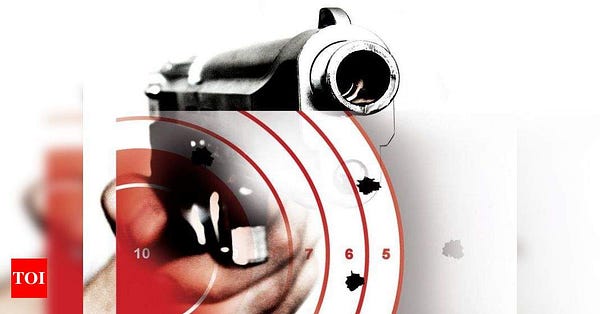
Democracy flourishes best in Uttar Pradesh Police Stations. In Kushinagar, Uttar Pradesh, a man was tortured by the police and beaten with a leather belt for hours simply because he wanted to marry someone. It should be a matter of pride for every Indian that he was then released by the police because it discovered that both the bride and the groom were Muslim. Imagine what would have happened if the bride wasn’t Muslim.
Garv se kaho hamein nafrat hai.
Speaking of police stations, in a welcome judgment, the Supreme Court has passed a judgment directing that police stations across the country must install CCTVs. I suspect however that it will be years if not decades before this is implemented in letter and spirit. I wrote about this judgment here.
It isn’t all doom and gloom but and the world is finally acknowledging that India is unique. The South Asia State of Minorities Report, 2020 notes that while “Civic space is under threat the world over”, “India’s case is unique in that the ‘unravelling’, as Freedom House recently called the ‘alarming setbacks’, has taken place at an extraordinary pace, over the span of a few years.” It also mentions the latest CIVICUS report and says that “India has recently joined Afghanistan, Bangladesh and Pakistan among the ranks of the world’s ‘repressed’ countries, CIVICUS’ second-lowest grade.
In some country, while granting bail to some person who comes on tv every night and incites hatred, some court had said ““If this court were not to interfere today, we are travelling on a path of destruction of personal liberty undeniably… If state govt’s target individuals in this manner, let’s send out a message that SC is there.”
Journalist Siddique Kappan and his lawyers are looking for that court. Kappan was arrested on October 5, 2020 in Uttar Pradesh while he was there to report on the Hathras case. He has alleged torture in prison. He continues to be in prison. For the first 43 days, he was not even allowed to talk to a lawyer.
The Uttar Pradesh government has said in India’s Supreme Court that Kappan refuses to divulge his social media passwords :(
What is the ‘message’ that all this is sending out? Is the SC there or not there?
The top court has finally found the time. No, not the time to hear the case about the legality of electoral bonds, but a time machine and the year they’ve landed in 1975.
The court has issued notice to the centre in a petition seeking that the emergency imposed in 1975 be declared unconstitutional today. So that’s about 45 years. I won’t be around but perhaps 2059 will be the year jab Hum Dekhenge?
Is it any wonder that with all this going on the Attorney General believes that even a cartoon can lower the already fragile prestige of the Supreme Court?

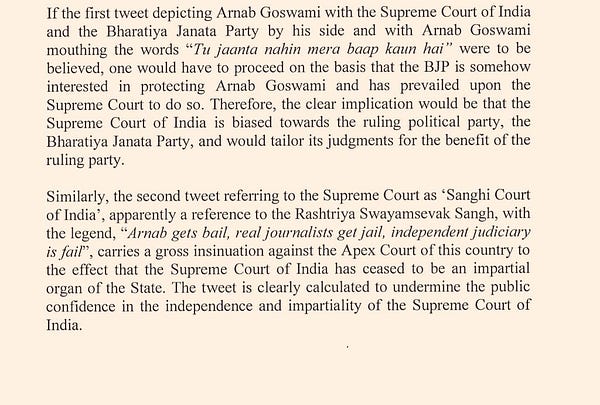
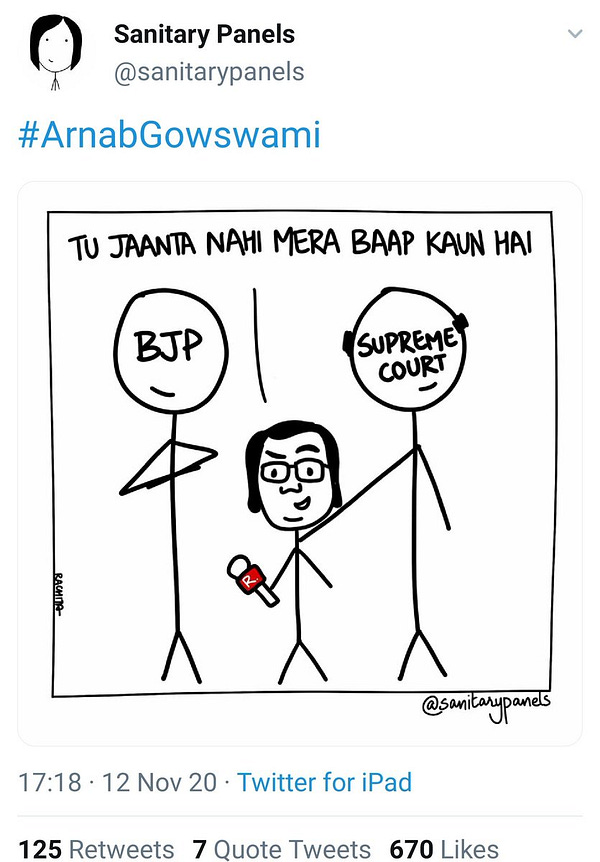
There are other courts which seem to have used the same machine and pushed the lever in another direction.
The Karnataka High Court says that the right to marry irrespective of Caste or Religion is a Fundamental Right.
The Allahabad High Court has HEARD A HABEAS CORPUS PETITION. How radical is that. Not just this, it has ordered the release of a Muslim Man booked under the National Security Act.
The Telangana High Court has slammed casteism and ‘Honour’ Killing. Speaking of which, our in-house cinema expert Shiv Kanungo has a recommendation for you:
Back to courts and democracy- after the failed attempt at adjusting democracy in India by denying straw and sipper to Stan Swamy, Jail authorities made another valiant attempt and tried to prevent Gautam Navlakha from getting spectacles without which he was unable to see the excess democracy in India. The Bombay High court however thwarted this noble mission and made the absurd claim that “Humanity is most important”.

It is written in our scriptures that when when pot has overflowed with democracy someone great has comed and kicked the pot to reduce the democracy. Yesterday was the one year anniversary of one instance of such greatness.


If it’s hope and inspiration you’re looking for, folk balladeer Sambhaji Bhagat and his team are teaching the fundamentals of the constitution of India to children in Maharashtra’s villages. You must read the story of this effort here
Priya Ramani has promised to write regularly in this newsletter about the women she loves. I promise to try my best to ensure that she keeps this promise. This week she writes about Loujain al-Hathloul:
“Few months before India arrested Sudha Bharadwaj, 29-year-old Loujain al-Hathloul was arrested by the Saudi Arabian government in May 2018 for, err, driving.Though Saudi Arabia lifted the driving ban shortly after arresting Loujain, more than a dozen women activists were detained, many of them for campaigning against the ban. The government says they “harmed Saudi interests” and “offered support to hostile elements abroad”. It’s their version of the Unlawful Activities (Prevention) Act (UAPA).


Like Bharadwaj, Loujain has been in jail for two years, the first 10 months without any charges or a trial. But unlike Bharadwaj, who is still waiting for the government to back up its list of charges (which include sections of the UAPA) in court, Loujain’s trial, which began briefly in March before the pandemic, resumed recently in a Specialized Terrorism Court. Reports say she’s been tortured, threatened, gone on hunger strikes and been out of communication for long periods.
Read this piece by Loujain where she narrates an account of her previous arrest and shares what drives her. “In 2013, when I first started my physical activism, it was my father who was summoned and punished for my actions. I felt insulted and furious towards such a decision, which sent a clear message: you, women, don’t exist,” she writes. In September 2016, she signed a petition to end Saudi Arabia’s male guardianship system.
I think it’s time for an incarceration edition of children’s book bestseller Good Night Tales For Rebel Girls. Every girl should know about the rebel women fighting to safeguard her future.”
Priya Ramani
Another new and regular edition of this Newsletter is going to be a student corner. A student will write about a book which left an indelible impression on them. This week it is Zayaan Ravouf Asimi from Gujarat National Law School, talking about “Legalizing Religion: The Indian Supreme Court and Secularism” by Ronojoy Sen.
“On 6th December 1992l, the Babri Masjid was illegally demolished by far-right Hindu nationalists. On 9th November 2019, The Supreme Court of India gave a verdict ordering the construction of a temple on the same site, while duly noting the demolition was illegal and those responsible for it should be punished. On 30th September 2019, a Special CBI Court acquitted all the accused in the demolition case. On 5th August 2020, the Prime Minister of India inaugurated the construction of the temple.
This series of events raises several questions- Is India truly secular? Are its institutions free of bias and political interference? Is politics itself free of religion? What is the nature of secularism in India? How far have our Courts gone to protect secularism and how have they interpreted it in the process?
Ronojoy Sen, in his book Legalizing Religion: The Indian Supreme Court and Secularism tries to answer these fundamental questions. From the Constituent Assembly Debates to the Hindutva judgements, the book attempts to analyze how the Supreme Court has rationalized religion and hence shaped the nature of constitutional secularism in India. While the Court has been called upon to balance individual freedom to practice religion with the freedom of a group to manage its religious affairs as a part of the constitutional machinery, what lies at the heart of such issues is the conflict between Nehruvian concept of Secularism and Sarvarkar’s idea of Hindutva. The interrelationship between individual, state, and religion is a complex one, and the book analyzes the relationship between one agency of the state-the Supreme Court- to the nature of constitutional secularism in India.
The book puts forward two main observations- that the Court has consistently tried to homogenize and rationalize religion, and that there is a significant overlap between judicial discourse and ontology of Hindu Nationalism which has narrowed down the space for religious freedom in India.
The book gives a good insight into the history of judicial interventions and the Court’s attempt to define what is “essential” to a religion. By contrasting the inclusivist approach to Hinduism espoused by President Radhakrishnan to the exclusivist approach propounded by Sarvarkar, the book critically analyzes how the Supreme Court conflated these approaches in the Hindutva judgments, and how such conflation could deprive Hinduism of its pluralistic character.
The book also comes with a commentary by Upendra Baxi, which further substantiates the claims made by the author while noting that Indian constitutional secularism is not “entirely an affair of political reason”, but is shaped by public sentiment, empathy, and solidarity.”
One final announcement. This newsletter will now go weekly. Every Saturday. Starting this Saturday. With no change in subscription price. The eventual goal is to go daily.
If you haven’t subscribed yet:
I close with this. It is extremely cold in New Delhi. Every year people die from the cold wave. In this cold wave thousands of farmers are sitting on the roads. They have been called Khalistani, Extremists, Cowards, Tukde-Tukde, Misled, agents of foreign countries, selfish and what not. People have tried to suggest that the farmers sitting there are rich spoilt people who are lamenting the loss of freebies. How many rich spoilt people do you know who are willing to or are able to sit on the streets in Delhis winters? Twenty protesting farmers have lost their lives. TWENTY. If you can’t give them your gratitude, please, at least don’t give them your hate and humiliation.
See you Saturday.




